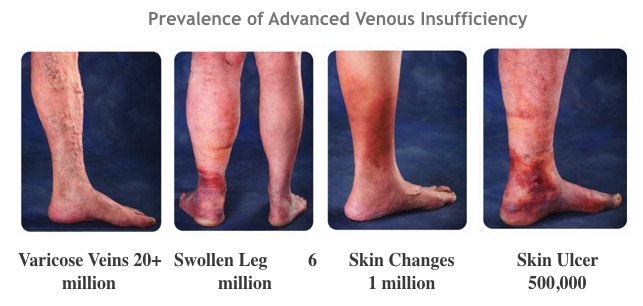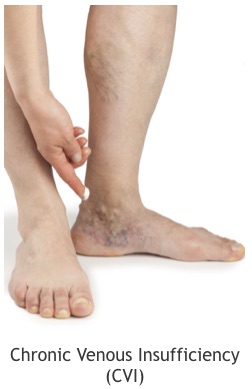Varicose veins are much more than just a cosmetic problem or a sign of aging. Often you can tell by observing the signs and symptoms of varicose veins. When varicose veins and symptoms are present, it can be a sign of Chronic Venous Insufficiency (CVI). The doctors at Inovia Vein Specialty Centers can help you better understand your options by discussing your signs and symptoms in a vein consultation.

If indicated, we can offer a number of medical and surgical treatments for this medical condition. It starts by understanding the signs and symptoms of varicose veins.
Signs of Varicose Veins
- Bulging large veins that are visible just under the surface of the skin.
- Swelling of your ankles and feet that worsens as the day goes on.
- Painful, achy, or “heavy” legs.
- Throbbing or cramping in your legs.
- Itchy legs, especially on the lower leg and ankle. This is often misdiagnosed as simply “dry skin”.
- Discolored skin below the knees, especially around the ankles.
Symptoms of Varicose Veins
- Leg pain, aching, swelling, heaviness or fatigue.
- Burning or itching of legs.
- Ankle discoloration and/or ulcers, open wounds or sores.
- Restless leg syndrome or cramps.
- Bleeding from varicose veins.
- Clots in the varicose veins.
Vein Problems are Common
Over 40% of the adult population suffers from some form of venous disease. In fact, almost half of men and women can expect to develop some sort of venous disease before they reach their 60’s. People most likely to develop venous insufficiency:
- Have a family history of varicose veins.
- Are or have been pregnant.
- Have work requiring prolonged standing.
- Have a history of leg injuries or clots.
Options for Treating Venous Disease Include:
- Watchful waiting
- Conservative management including walking, leg elevation and compression stockings
- Surgical management with one of the minimally invasive office-based techniques. This includes options such as Closurefast, Venaseal and Varithena as well as sclerotherapy.
Vein issues are very common, therefore understanding your options is important. Our doctors at the Inovia Vein Specialty Centers can evaluate your symptoms and, with the assistance of a venous ultrasound, help determine the best solution for treating your venous disease. Consequently, you can decide if watchful waiting, compression, or some of the procedures available to treat this common problem are for you.

Call 1-800-834-6362 to Schedule a Consultation or Use Our
Frequently Asked Questions
Varicose Veins
Treatments are usually minimally invasive, causing little discomfort. Patients may feel mild stinging or pressure during procedures, but local anesthesia enhances comfort. Recovery is generally quick, with minimal pain.
You should see a doctor if you experience pain, swelling, skin changes, non-healing sores, or varicose veins that interfere with daily activities.
Regular exercise, being at a healthy weight, keeping the legs elevated, avoiding lengthy sitting or standing, and wearing compression stockings can promote circulation and minimize vein pressure, helping to prevent progression.
Varicose veins can cause more serious complications like chronic swelling, skin ulcers, blood clots (deep vein thrombosis), and venous eczema. In severe cases, skin discoloration and painful sores may develop, impacting mobility and quality of life.
Early signs include leg swelling, aching, heaviness, itching, and cramping, especially after prolonged standing or sitting. Skin changes, such as discoloration or mild swelling around the ankles, can also indicate poor circulation before varicose veins become visible.
Patients are typically able to resume normal activities 24-hours after vein treatment, but travel may pose additional risks. Sitting in a car or airplane for several hours can increase the risk of a blood clot, so it’s important to know blood clot symptoms and understand ways to mitigate the risks. If a patient is planning a long trip, especially out of the country, we recommend rescheduling procedures for after they return.
In the modern era of office based procedures such as Closurefast RFA, Venaseal or Varithena - which are far less invasive and painful than the old techniques of vein stripping - we tell most patients they can go back to their usual activities the next day. Most patients can walk into our office, have the procedure, and walk out. If they don’t take any medications like valium, they can drive themselves home. We ask patients to take it easy the first night, but after that they are able to go back to work, exercise, and continue other daily activities.
Compression can be helpful for patients with symptoms from varicose veins. Some patients will find that compression stockings help, but not all patients benefit and some need to have procedures to help treat their veins to help them feel better.
Varicose veins do not go away on their own. They in fact tend to worsen with time.
Generally yes. Massage is great to help stimulate the nerves in the skin, veins and muscle that can help improve lymphatic flow. Also, it can help relieve sore muscles and facilitate more movement, which is great for vein health.
A healthy diet is important for vein health. Being overweight tends to make vein problems worse. Also, certain foods are known to be inflammatory for certain patients. Vein conditions involve inflammation and when foods contribute to that, varicose vein symptoms can be worse.
Walking and movement are generally helpful for vein health. This is especially true for patients with venous insufficiency (Varicose Veins). When walking, the calf veins are squeezed by the calf muscle, which helps reduce pooling of blood in the lower legs.